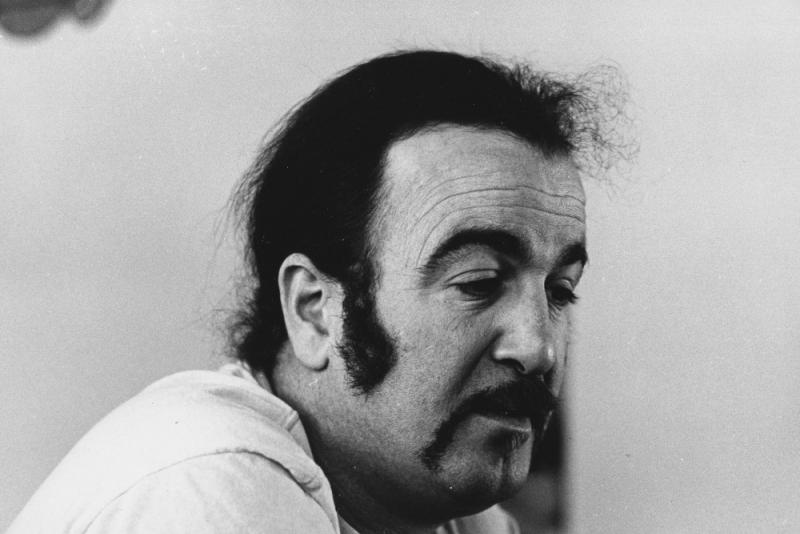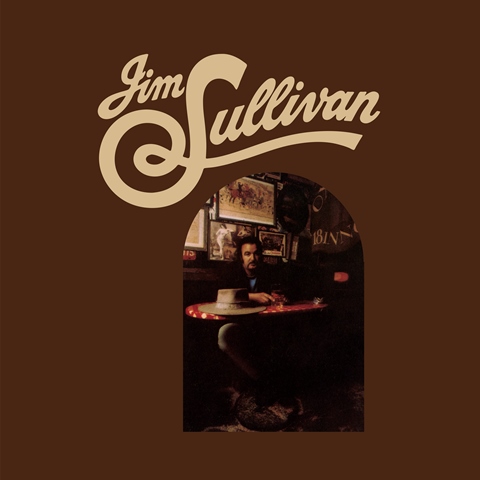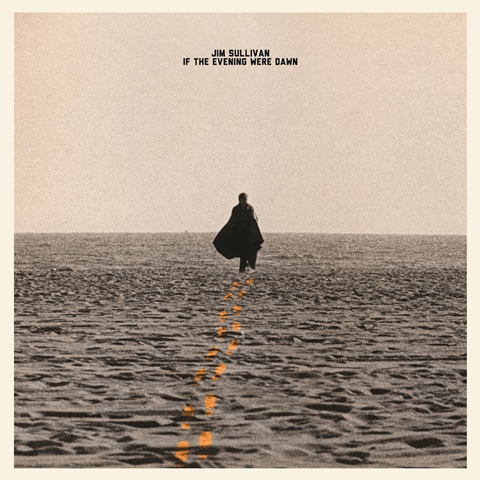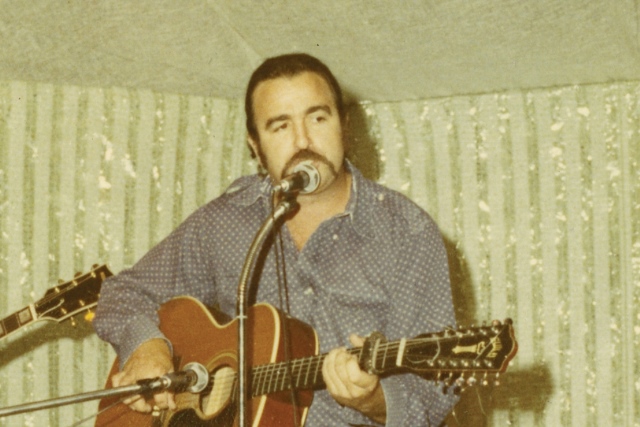Reissue CDs Weekly: Jim Sullivan | reviews, news & interviews
Reissue CDs Weekly: Jim Sullivan
Reissue CDs Weekly: Jim Sullivan
Revealed: what came before and after the belatedly lauded ‘U.F.O.’ album

Hugh Hefner established Playboy Records in 1972 as an arm of his male-targeted business empire. Amongst the singles issued in its first year were seven-inchers by jazzer Bobby Scott, proto-yacht rockers The Hudson Brothers, singer-songwriter Tim Rose, Björn & Benny (with Svenska Flicka), who were ABBA before they had a name, and Michael Jarrett, who’d written “I'm Leavin'” for Elvis Presley.
Other notables included country staple Mickey Gilley, soul star Major Lance, soft rockers Hamilton, Joe Frank & Reynolds and, late in the imprint’s day, powerpoppers Blue Ash. Beserkley Records, Jonathan Richman’s home, had a business tie-in with Playboy Records. In this eclectic and mostly hit-free grab-bag, an eponymous 1972 album by LA-based singer-songwriter Jim Sullivan attracted little attention.
 Probably, Jim Sullivan would have remained unnoticed without the 2010 reissue of Sullivan’s only other album, 1969’s U.F.O. – originally issued by the private Monnie label and then re-released the next year by Century City Records, an offshoot of a private equity company. U.F.O. barely had a profile when it first escaped but its reappearance exposed it as a sit-up, take-notice album. Sullivan was belatedly revealed to be a moody, country influenced singer-songwriter with a bent for mystical lyrics. While in the (very early) Kris Kristofferson, John Hartford and Val Stoecklein bag he had his own, affectingly downbeat voice.
Probably, Jim Sullivan would have remained unnoticed without the 2010 reissue of Sullivan’s only other album, 1969’s U.F.O. – originally issued by the private Monnie label and then re-released the next year by Century City Records, an offshoot of a private equity company. U.F.O. barely had a profile when it first escaped but its reappearance exposed it as a sit-up, take-notice album. Sullivan was belatedly revealed to be a moody, country influenced singer-songwriter with a bent for mystical lyrics. While in the (very early) Kris Kristofferson, John Hartford and Val Stoecklein bag he had his own, affectingly downbeat voice.
Interest was further piqued by learning Sullivan disappeared three years after the Playboy album. He had set off from Los Angeles on 4 March 1975 for Tennessee on an expedition designed to find out whether Nashville would be receptive to his music. His abandoned car was impounded on 8 March, after being found on a New Mexico ranch 23 miles from the nearest main road. His belongings were left in the car and at a motel in Santa Rosa. He was never seen again.
Speculation about Sullivan’s fate continues but U.F.O. was hard evidence that he was worth paying attention to. Now, Jim Sullivan (the Playboy album) has been reissued. It is accompanied by If the Evening Were Dawn, a collection of demo recordings taped in 1969. U.F.O. has been given a musical before and after.
 One thing is immediately clear. Sullivan’s music existed in a self-determined continuum. If the Evening Were Dawn collects ten tracks, five of which made the cut for U.F.O.: “Roll Back the Time”, “Sandman”, “Jerome”, “So Natural” and “Whistle Stop”. Jim Sullivan includes re-recordings of U.F.O’s “Sandman” and “Plain as Your Eyes Can See” (as “Plain to See”).
One thing is immediately clear. Sullivan’s music existed in a self-determined continuum. If the Evening Were Dawn collects ten tracks, five of which made the cut for U.F.O.: “Roll Back the Time”, “Sandman”, “Jerome”, “So Natural” and “Whistle Stop”. Jim Sullivan includes re-recordings of U.F.O’s “Sandman” and “Plain as Your Eyes Can See” (as “Plain to See”).
If the Evening Were Dawn finds Sullivan alone and with an acoustic guitar. While fascinating to hear the U.F.O. songs in a bare-bones form without the instrumentation subsequently added in the studio, these are the strongest tracks. Of the previously unheard material, “Walls”, with its Fred Neil echoes, is good. So is the dynamic “What to Tell Her”. “So Natural” marries doomy, fatalistic lyrics to a downbeat melody, implying Sullivan understood that the Sixties dream was a form of mirage.
 Jim Sullivan is not as arresting as U.F.O. It begins with “Don’t Let it Throw You”, a light, country inclined outing along the Glen Campbell, Gordon Lightfoot and John Stewart lines, an impression bolstered by an arrangement enhancing the song’s kinship with “Gentle on My Mind”. As the album also includes a version of Stewart’s “Lonesome Picker”, perhaps Sullivan was seen by the label as a comparable contender. (pictured right, Jim Sullivan on stage, c. 1972)
Jim Sullivan is not as arresting as U.F.O. It begins with “Don’t Let it Throw You”, a light, country inclined outing along the Glen Campbell, Gordon Lightfoot and John Stewart lines, an impression bolstered by an arrangement enhancing the song’s kinship with “Gentle on My Mind”. As the album also includes a version of Stewart’s “Lonesome Picker”, perhaps Sullivan was seen by the label as a comparable contender. (pictured right, Jim Sullivan on stage, c. 1972)
This potential, though, is undercut by “Biblical Boogie (True he’s Gone)” with its clunky, intrusively brass-dominated shuffling arrangement. “Amos” is similarly cluttered. The scrappy “Tom Cat” aims for and misses a Tony Joe White feel. The standouts are the songs where Sullivan is left to get on with it; those sharing U.F.O.’s brooding ambience – the stunning “Tea Leaves” and the sardonically autobiographical “Sunny Jim”. Despite the inconsistent album’s highlights, 1972 was too late for this sort of thing. Jim Sullivan would have been a more comfortable fit with 1969 or 1970.
These two releases neither boost or weaken the reputation Sullivan acquired after the 2010 reappearance of U.F.O. Instead, they add to the picture by confirming that his music was integral to an on-going creative narrative. They also raise the question of whether there are any recordings of his mid Sixties band The Survivors. Start with U.F.O., track back to If the Evening Were Dawn and then, once convinced, carefully dip into Jim Sullivan.
- Next week: Lost British underground rockers Big Front Yard
- Read more reissue reviews on theartsdesk
- Kieron Tyler’s website
Explore topics
Share this article
The future of Arts Journalism
You can stop theartsdesk.com closing!
We urgently need financing to survive. Our fundraising drive has thus far raised £49,000 but we need to reach £100,000 or we will be forced to close. Please contribute here: https://gofund.me/c3f6033d
And if you can forward this information to anyone who might assist, we’d be grateful.

Subscribe to theartsdesk.com
Thank you for continuing to read our work on theartsdesk.com. For unlimited access to every article in its entirety, including our archive of more than 15,000 pieces, we're asking for £5 per month or £40 per year. We feel it's a very good deal, and hope you do too.
To take a subscription now simply click here.
And if you're looking for that extra gift for a friend or family member, why not treat them to a theartsdesk.com gift subscription?
more New music
 'Deadbeat': Tame Impala's downbeat rave-inspired latest
Fifth album from Australian project grooves but falls flat
'Deadbeat': Tame Impala's downbeat rave-inspired latest
Fifth album from Australian project grooves but falls flat
 Heartbreak and soaring beauty on Chrissie Hynde & Pals' Duets Special
The great Pretender at her most romantic and on the form of her life
Heartbreak and soaring beauty on Chrissie Hynde & Pals' Duets Special
The great Pretender at her most romantic and on the form of her life
 The Last Dinner Party's 'From the Pyre' is as enjoyable as it is over-the-top
Musically sophisticated five-piece ramp up the excesses but remain contagiously pop
The Last Dinner Party's 'From the Pyre' is as enjoyable as it is over-the-top
Musically sophisticated five-piece ramp up the excesses but remain contagiously pop
 Moroccan Gnawa comes to Manhattan with 'Saha Gnawa'
Trance and tradition meet Afrofuturism in Manhattan
Moroccan Gnawa comes to Manhattan with 'Saha Gnawa'
Trance and tradition meet Afrofuturism in Manhattan
 Soulwax’s 'All Systems Are Lying' lays down some tasty yet gritty electro-pop
Belgian dancefloor veterans return to the fray with a dark, pop-orientated sound
Soulwax’s 'All Systems Are Lying' lays down some tasty yet gritty electro-pop
Belgian dancefloor veterans return to the fray with a dark, pop-orientated sound
 Music Reissues Weekly: Marc and the Mambas - Three Black Nights Of Little Black Bites
When Marc Almond took time out from Soft Cell
Music Reissues Weekly: Marc and the Mambas - Three Black Nights Of Little Black Bites
When Marc Almond took time out from Soft Cell
 Album: Mobb Deep - Infinite
A solid tribute to a legendary history
Album: Mobb Deep - Infinite
A solid tribute to a legendary history
 Album: Boz Scaggs - Detour
Smooth and soulful standards from an old pro
Album: Boz Scaggs - Detour
Smooth and soulful standards from an old pro
 Emily A. Sprague realises a Japanese dream on 'Cloud Time'
A set of live improvisations that drift in and out of real beauty
Emily A. Sprague realises a Japanese dream on 'Cloud Time'
A set of live improvisations that drift in and out of real beauty
 Trio Da Kali, Milton Court review - Mali masters make the ancient new
Three supreme musicians from Bamako in transcendent mood
Trio Da Kali, Milton Court review - Mali masters make the ancient new
Three supreme musicians from Bamako in transcendent mood
 Hollie Cook's 'Shy Girl' isn't heavyweight but has a summery reggae lilt
Tropical-tinted downtempo pop that's likeable if uneventful
Hollie Cook's 'Shy Girl' isn't heavyweight but has a summery reggae lilt
Tropical-tinted downtempo pop that's likeable if uneventful

Add comment